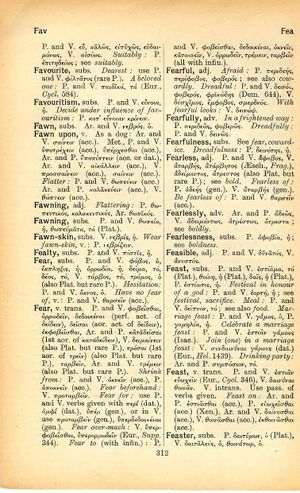favourite: Difference between revisions
From LSJ
Ὁ θάνατος οὐθὲν πρὸς ἡμᾶς, ἐπειδήπερ ὅταν μὲν ἡμεῖς ὦμεν, ὁ θάνατος οὐ πάρεστιν, ὅταν δὲ ὁ θάνατος παρῇ, τόθ' ἡμεῖς οὐκ ἐσμέν. → Death is nothing to us, since when we are, death has not come, and when death has come, we are not.
(CSV4) |
mNo edit summary |
||
| Line 1: | Line 1: | ||
{{Woodhouse1 | {{Woodhouse1 | ||
|Text=[[File:woodhouse_312.jpg|thumb|link={{filepath:woodhouse_312.jpg}}]]'''subs.''' | |Text=[[File:woodhouse_312.jpg|thumb|link={{filepath:woodhouse_312.jpg}}]]'''subs.''' | ||
[[dearest]]: use P. and V. [[φίλτατος]] (rare P.). | |||
[[a beloved one]]: P. and V. παιδικά, τά (Eur., ''Cycl.'' 584). | |||
}} | }} | ||
Revision as of 10:31, 10 September 2019
English > Greek (Woodhouse)
subs.
dearest: use P. and V. φίλτατος (rare P.).
a beloved one: P. and V. παιδικά, τά (Eur., Cycl. 584).

